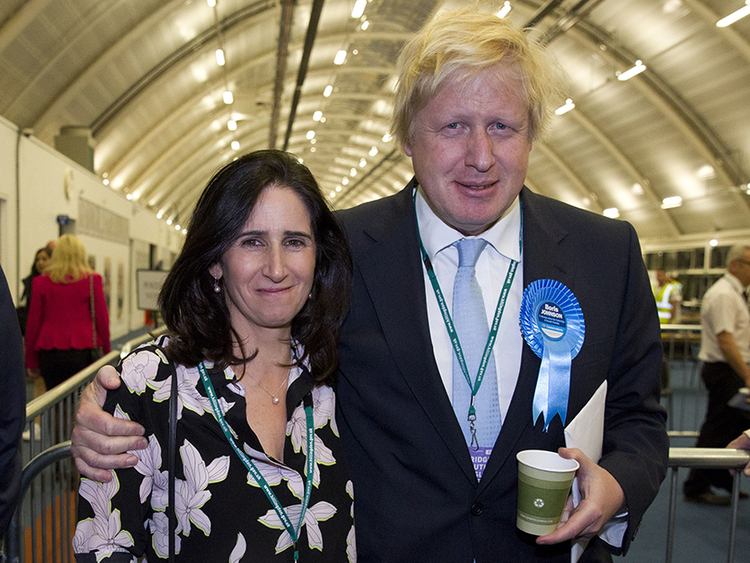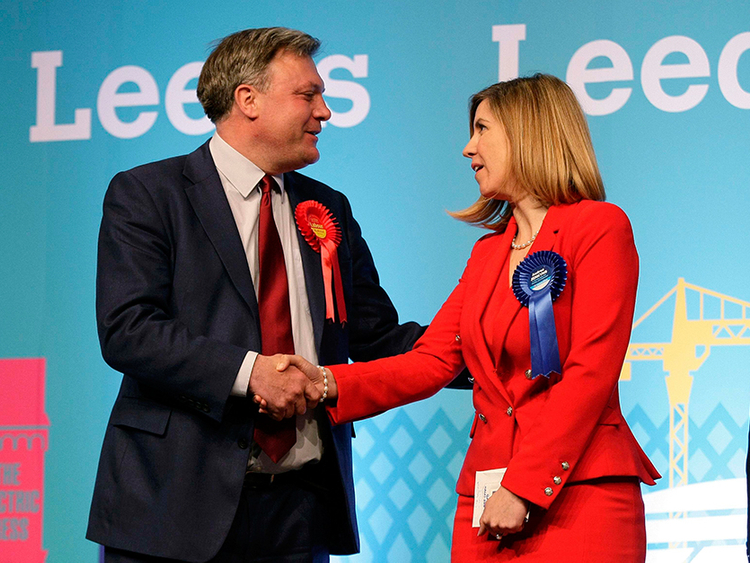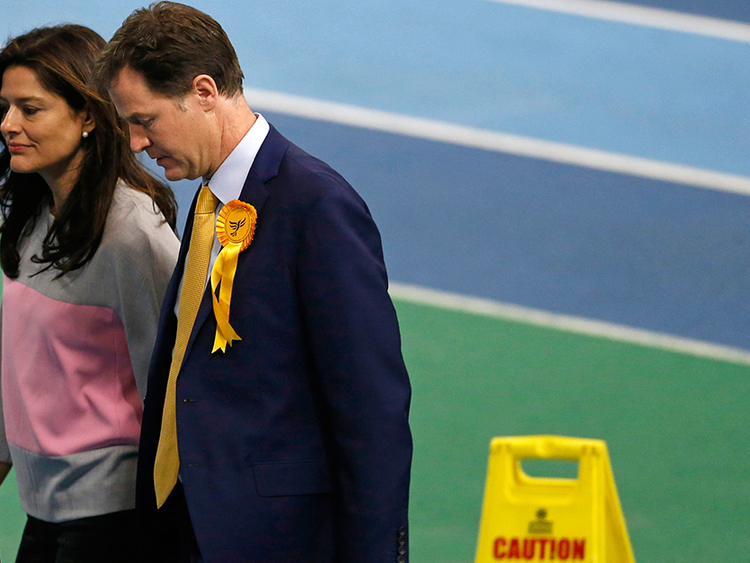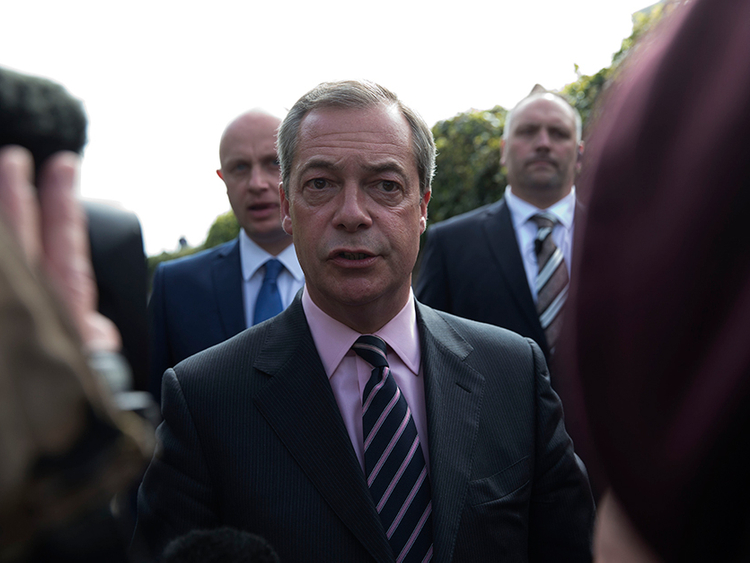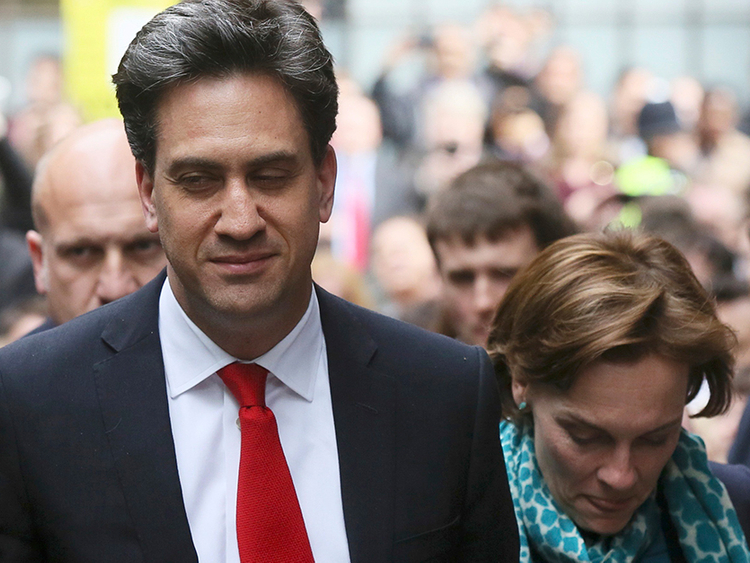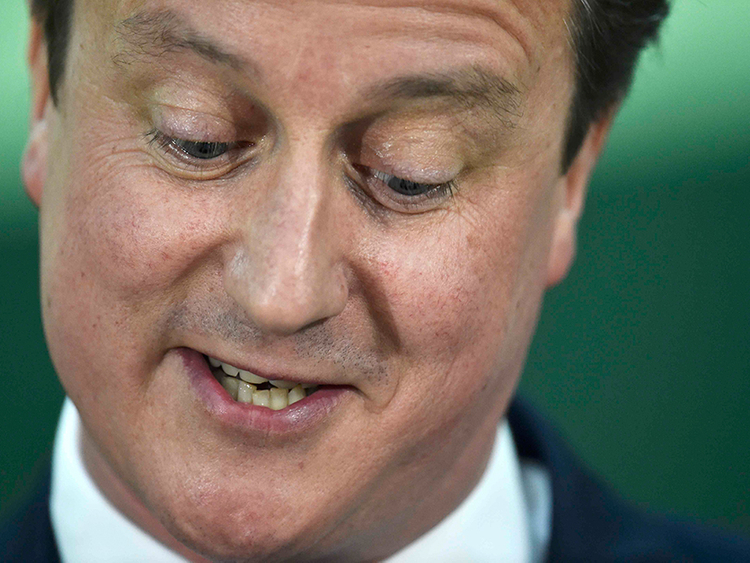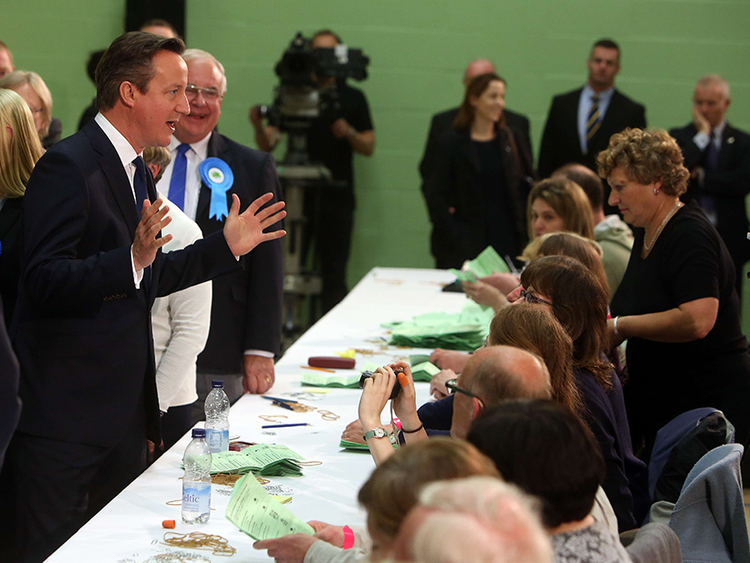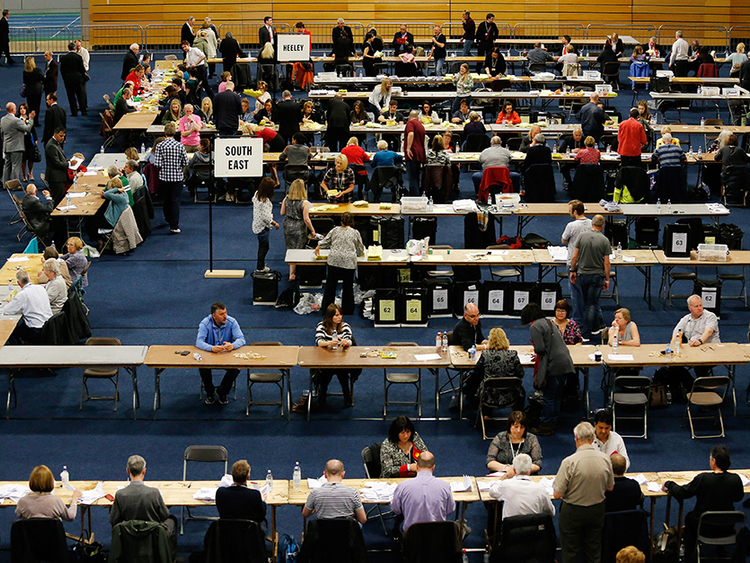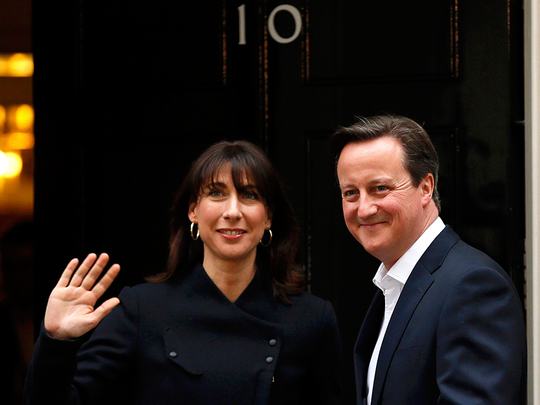
David Cameron is back in Downing Street for a second term after the Conservatives defied predictions to trounce Labour and win their first outright majority in parliament since 1992. But the country he leads faces unprecedented strain after a night of triumph for Scottish nationalists.
A night of high drama saw a swath of politicians who have dominated UK politics for a decade lose their seats and three party leaders step down, including Labour's Ed Miliband.
The full UK election results (as of 2:40 PM GMT, 18:40 UAE) Conservatives: 331, Labour: 232, SNP: 56, Lib Dem: 8, UKIP: 1, Green: 1, Plaid Cymru: 3, Others: 18
UK election results| Party & leader | Seats | ||
|---|---|---|---|
|
329
51%
|
|||
|
|
|||
|
232
36%
|
|||
|
|
|||
|
56
9%
|
|||
|
|
|||
|
8
1%
|
|||
|
|
|||
|
8
1%
|
|||
|
|
|||
|
4
1%
|
|||
|
|
|||
|
3
0%
|
|||
|
|
|||
|
3
0%
|
|||
|
|
|||
|
2
0%
|
|||
|
|
|||
|
1
0%
|
|||
|
|
|||
|
1
0%
|
|||
|
|
|||
|
|
Others
|
1
0%
|
|
|
|
|||
|
0
0%
|
|||
|
|
|||
|
0
0%
|
|||
|
|
|||
There was dejection in the ranks of Labour and the Liberal Democrats but jubilation among Conservatives, and in the Scottish National Party, which swept the board in Scotland.
Nick Clegg has resigned as leader of Britain's Liberal Democrats after a disastrous result for his party in the election. Clegg said he must take responsibility for the party's losses, which he described as much more crushing that he expected. The Liberal Democrats, the Conservatives' junior coalition partner, lost most of the seats they held in Parliament. Many of their most senior and experienced politicians lost their seats.
Nigel Farage (below) has resigned as leader of the populist UK Independence Party after failed to win a seat in the UK parliamentary election. Farage, who had earlier promised to resign if he lost, told activists "I'm a man of my word." But he raised the prospect he would consider running again in the future.
| Party & leader | Seats | ||
|---|---|---|---|
|
317
49%
|
|||
|
|
|||
|
228
35%
|
|||
|
|
|||
|
56
9%
|
|||
|
|
|||
|
8
1%
|
|||
|
|
|||
|
8
1%
|
|||
|
|
|||
|
4
1%
|
|||
|
|
|||
|
3
0%
|
|||
|
|
|||
|
3
0%
|
|||
|
|
|||
|
2
0%
|
|||
|
|
|||
|
1
0%
|
|||
|
|
|||
|
1
0%
|
|||
|
|
|||
|
|
Others
|
1
0%
|
|
|
|
|||
|
0
0%
|
|||
|
|
|||
|
0
0%
|
|||
|
|
|||
|
|
Other parties
|
||
|
|
|||
WESTMINSTER, LONDON: The Conservatives will form the new British government, with party leader David Cameron ready to visit Queen Elizabeth at 1230 London time Friday to request her consent to form her next government. In a stunning electoral outcome, the conservatives managed to win 320 seats with 15 constituencies due to report in the coming hours.
“This is the sweetest victory of all,” a jubilant Cameron told party supporters.
For Labour, the election was a stunning lost. It was virtually wiped out in Scotland, retaining just a single seat in Scotland and enter the new parliament with 20 seats less than before.
Cameron can't wait to buckle up to work, saying France's Hollande has invited him to Paris to discuss EU and international matters.
Ed Miliband, the party's leader, will step down by 12 noon and he is currently meeting party officials here in London.
But it was in Scotland that a seismic shift occurred – with the Scottish National Party winning 56 of the 59 seats north of the border.
Labour's vote in Scotland collapsed – largely as a result of it opposing independence in last September's referendum and because the party leader, Ed Miliband, ruled out any post-election coalition deal with the SNP.
“This is an enormous moment for the SNP,” Jim Murphy, the leader of Labour in Scotland said after losing his seat after 18 years in parliament. “But never mistake a party for a flag or a country.”
Liberal Democrats, who were the junior coalition partners with Cameron's Conservatives going into Thursday's election, also saw their support collapse, leaving it with a possible 10 seats, down 57 in the previous parliament.
Liberal Democrat leader Nick Clegg, who managed to hold his seat in Sheffield Hallam, was also under pressure to resign.
Welsh nationalists Plaid Cymru were on course to win four seats, while the Greens looked likely to double their representation from one to two seats. Reporting by Mick O'Reilly, Senior Associate Editor
| Party & leader | Seats | ||
|---|---|---|---|
|
301
46%
|
|||
|
|
|||
|
222
34%
|
|||
|
|
|||
|
56
9%
|
|||
|
|
|||
|
8
1%
|
|||
|
|
|||
|
8
1%
|
|||
|
|
|||
|
4
1%
|
|||
|
|
|||
|
3
0%
|
|||
|
|
|||
|
3
0%
|
|||
|
|
|||
|
2
0%
|
|||
|
|
|||
|
1
0%
|
|||
|
|
|||
|
1
0%
|
|||
|
|
|||
|
|
Others
|
1
0%
|
|
|
|
|||
|
0
0%
|
|||
|
|
|||
|
0
0%
|
|||
|
|
|||
Labour finance spokesman Ed Balls loses parliament seat
Conservative candidate Andrea Jenkyns shakes hands with Britain's opposition Labour Party shadow Chancellor Ed Balls after defeating him.
The Labour politician who had vied to become Britain's next finance minister has lost his seat in parliament, election officials said on Friday, in one of the most high-profile losses for the opposition at Thursday's national election. Ed Balls, a Labour member of parliament since 2005 and a long-time ally of former Prime Minister Gordon Brown, lost his seat on the outskirts of the northern English city of Leeds to a Conservative challenger by a margin of just 422 votes.
Here's to a brighter future for everyone. pic.twitter.com/EeN0YFAvBm— David Cameron (@David_Cameron) May 8, 2015
The next government has a huge responsibility to bring our country together. What unites us is much, much more than what divides us.— Ed Miliband (@Ed_Miliband) May 8, 2015
One nation, one United Kingdom - that is how I hope to govern if I am fortunate enough to continue as Prime Minister.— David Cameron (@David_Cameron) May 8, 2015
SNP sweeps Scottish seats
The Scottish National Party (SNP) has emerged as one of the biggest winners in Britain's general election after securing 56 of the 59 parliamentary seats available in Scotland.
SNP leader Nicola Sturgeon said the election marked a "historic watershed" for her party, which gained most of its seats from Labour.
Britain elects first ethnic-Chinese MP
Alan Mak, a former corporate lawyer whose parents emigrated to Britain from southern China, became the first ethnic-Chinese person to be elected to the House of Commons on Friday.
Cambridge-educated Mak, 31, comfortably won the constituency of Havant in southern England for the Conservatives, taking more than 51 per cent of the votes cast, according to results from the general election.
"I'm honoured and delighted to be elected the new member of parliament for Havant," Mak said in comments published by the Portsmouth News website.
| Party & leader | Seats | ||
|---|---|---|---|
|
262
40%
|
|||
|
|
|||
|
214
33%
|
|||
|
|
|||
|
55
8%
|
|||
|
|
|||
|
8
1%
|
|||
|
|
|||
|
7
1%
|
|||
|
|
|||
|
4
1%
|
|||
|
|
|||
|
3
0%
|
|||
|
|
|||
|
3
0%
|
|||
|
|
|||
|
2
0%
|
|||
|
|
|||
|
1
0%
|
|||
|
|
|||
|
|
Others
|
1
0%
|
|
|
|
|||
|
0
0%
|
|||
|
|
|||
|
0
0%
|
|||
|
|
|||
|
0
0%
|
|||
|
|
|||
London stock market surges
London's stock market surged at the start of trading on Friday as Prime Minister David Cameron's Conservatives looked set for a surprise victory in Britain's general election. The benchmark FTSE 100 index rallied 2.0 per cent in initial deals to 7,024.37 points.
The pound rallied with UK stocks and bonds as results in Britain’s general election suggested the Conservative Party was on course to win a majority, ending investor concern that drawn-out coalition talks would be needed. Sterling surged the most since 2009 against the euro, and strengthened at least 1.2 per cent versus all of its 16 major counterparts. Gilt yields fell the most in almost two months, shares of banks jumped and measures of anticipated swings in the currency tumbled.
Predictions
Volunteers count ballot papers inside the English Institute of Sport.
With 508 of 650 constituencies reporting results Friday morning in Britain's parliamentary election, the Conservatives were leading with 222 seats, according to election officials. The opposition Labour Party has won 203 seats and the Scottish National Party 55. Eight seats have gone to the Democratic Unionists in Northern Ireland, while the Liberal Democrats won six seats and the UK Independence Party earned one. Thirteen seats went to other smaller parties. An exit poll has predicted that the Conservatives will be the top party in Thursday's vote, winning 316 of the 650 seats in the House of Commons.
A woeful Clegg
Liberal Democrat Party leader Nick Clegg managed to hang on to his seat in Parliament when results were announced on Friday morning, but admitted that his party had suffered a terrible string of setbacks in Britain's general election. The party that had been the junior partner in a Conservative-led government lost most of its seats. An exit poll suggested it would win perhaps 10 of the 650 seats in the House of Commons - down from 56 - and several major party figures were ousted by voters.
Nick Clegg and his wife Miriam Gonzalez Durantez
After his own win, a woeful Clegg said "It is now painfully clear this has been a cruel and punishing night for the Liberal Democrats." Clegg, who has served as the UK's deputy prime minister for the last five years, hinted that he would be discussing his party leadership with colleges later Friday.
George Galloway lost
George Galloway, one of Britain's most colourful and controversial figures, has lost his Bradford West seat to the Labour Party.
| Party & leader | Seats | ||
|---|---|---|---|
|
191
29%
|
|||
|
|
|||
|
187
29%
|
|||
|
|
|||
|
54
8%
|
|||
|
|
|||
|
8
1%
|
|||
|
|
|||
|
6
1%
|
|||
|
|
|||
|
4
1%
|
|||
|
|
|||
|
3
0%
|
|||
|
|
|||
|
3
0%
|
|||
|
|
|||
|
2
0%
|
|||
|
|
|||
|
1
0%
|
|||
|
|
|||
|
|
Others
|
1
0%
|
|
|
|
|||
|
0
0%
|
|||
|
|
|||
|
0
0%
|
|||
|
|
|||
|
0
0%
|
|||
|
|
|||
British PM hails 'strong' Conservative
British Prime Minister David Cameron on Friday hailed "a very strong night" for his Conservative Party, which appeared set to win the most seats in a general election against centre-left Labour. "This is clearly a very strong night for the Conservative party," he said. But he added: "It is too early to say exactly what sort of result there will be at the end of this night."
Nick Clegg's official spokesman says Clegg will outline future plans "in a few hours". Does not dampen speculation Clegg will quit #GE2015— Kamal Ahmed (@bbckamal) May 8, 2015
Labour leader Miliband admits 'disappointing' UK vote
Labour leader Ed Miliband admitted on Friday his party had a "very disappointing and difficult night" in Britain's election, in which exit polls indicated a surprise surge for the centre-right Conservative party. "The results are still coming in but this has clearly been a very disappointing and difficult night for the Labour party. We haven't made the gains we wanted in England and Wales, and in Scotland we have seen a surge of nationalism overwhelm our party," Miliband told voters after being re-elected to his seat.
Latest #GE2015 totals, with nearly 250 seats still to declare http://t.co/jpy6wse1Rp pic.twitter.com/FIDtsEJN7Q— BBC Breaking News (@BBCBreaking) May 8, 2015
London Mayor Johnson secures Uxbridge seat for Conservatives
London Mayor Boris Johnson won a seat in the UK House of Commons, taking a first step to a possible bid to succeed David Cameron as Conservative leader. Johnson took 22,511 votes in the West London district of Uxbridge and South Ruislip, a Tory majority of 10,695 compared with 11,216 in 2010. Labour candidate Chris Summers came second with 11,816 votes.
London Mayor and Conservative Party parliamentary candidate for Uxbridge and Ruislip South, Boris Johnson and his wife Marina Wheeler.
Johnson’s victory in a seat held by the Tories since 1970 will strengthen speculation about a leadership bid. Cameron has said he won’t serve a third term as prime minister. Bookmakers make Johnson the favorite to take over, ahead of Home Secretary Theresa May and Chancellor of the Exchequer George Osborne.
“The people of Britain have finally spoken,” Johnson said in his victory speech. “They have decisively rejected any attempt to take this country back to the 1970s.”
Johnson, 50, whose shock of blond hair, tousled appearance and off-the-cuff remarks have made him one of Britain’s best- known politicians, has attracted support from beyond traditional Conservative Party spheres. His re-election as London mayor in 2012 bucked a national trend that had seen Labour gain popularity, while the Olympics in London the same year further enhanced his profile.
Nationalist victory in Scotland sets up clash over UK’s future
.@NicolaSturgeon describes them as her magnificent 7 - the Glasgow SNP victors pic.twitter.com/kDiBUEhmYg— Laura Bicker (@BBCLBicker) May 8, 2015
An historic election victory for the Scottish nationalists just months after losing an independence referendum has raised the prospect of another battle with the next government over the future of the UK.
Thanks so much to everyone who voted @theSNP today. Whatever the results, I'm very proud of our campaign #GE15— Nicola Sturgeon (@NicolaSturgeon) May 7, 2015
With 50 of Scotland’s 59 parliamentary districts counted, the Scottish National Party took all but two and was on course to become the third-largest party in the UK Parliament. It’s the SNP’s best-ever result in a UK vote and comes mainly at the expense of Labour, whose losses dashed its hopes of taking power from Prime Minister David Cameron’s Conservatives.
Congratulations to fellow Aberdeenshire candidates @StuDonaldsonSNP and @EilidhWhiteford pic.twitter.com/qkadrxVGsa— Alex Salmond (@AlexSalmond) May 8, 2015
SNP Leader Nicola Sturgeon, who also runs the semi- autonomous government in Edinburgh, is pressing for full control over Scotland’s finances after the UK parties promised more power in the run-up to September’s independence vote. The question now is whether what’s offered will be enough to persuade her not to go back to the electorate.
Sturgeon, 44, who replaced Alex Salmond, 60, as leader after he quit a day after the referendum, avoided the issue of another independence vote during the campaign and hasn’t stated whether it would feature in the campaign for Scottish Parliamentary elections next year. New powers over the economy and taxation put forward by the government in recent months don’t reflect the promises to Scottish voters to persuade them to vote against independence, said Stewart Hosie, deputy leader of the SNP.
“The assessment is that that there can be a referendum when there’s a qualitative change in circumstances,” Hosie said in an interview with BBC Scotland after the exit poll. “We need to see a Westminster response.”
Britain's Labour Party leader Ed Miliband and his wife Justine arrive for the general election count in Doncaster, Britain
Labour faces worst result since 1987
Labour figures appeared shell-shocked on Thursday night as they realised that the party might be on course for its worst general election result since 1987.
As the main exit poll forecast the party would win just 239 parliamentary seats, Ed Miliband was widely expected to resign on Friday as leader of the opposition party. A senior Labour figure said: "It's all over for him."
There was shock and despondency in Labour's headquarters in Victoria, London, as the extent of its potential defeat sank in. "Jesus Christ," said one party aide. "It's over. It's over."Labour's John Mann says it is "inconceivable" that Ed Miliband will lead Labour into next election #ge2015— norman smith (@BBCNormanS) May 8, 2015
Owen Jones, the leftwing commentator, declared: "If this exit poll is correct, it's a total catastrophe and there's no glossing over that."
The party was braced for a defeat of historic proportions. Among the figures to lose their seats was Douglas Alexander, chair of Labour's national election campaign, and Jim Murphy, Scottish Labour leader.
David Blunkett, former home secretary, said it was a "very, very bad night".
The poll suggested that Labour's total tally of MPs would be just 239 - down 19 from the 258 it won at the last general election under Gordon Brown's leadership - mainly because of its losses in Scotland.
The party had been predicted to take several seats from the Liberal Democrats. But it looked likely to make insufficient headway in crucial Labour-Tory battlegrounds to counteract the loss of almost all its seats in Scotland.
Among the first results was Swindon North - a Tory-held marginal - where there was a swing of 4.3 per cent from Labour to the Conservatives. In Nuneaton, a crucial marginal, the vote shifted 3 per cent towards the Tories.
The only glimmer of hope came from a rival poll on Thursday by YouGov: it put Labour only 21 seats behind the Tories at 263 to 284. Agencies
Early results point to Conservative victory
David Cameron is on course to return to Downing Street with early results pointing to a dramatic Conservative election victory, but the country he leads is straining apart after a night of triumph for Scottish nationalists.
Early results supported exit polls forecasts that the Conservatives would win 316 seats, within touching distance of the 323 seats Cameron needs for an effective majority and a much better result than he had dared to expect.Congratulations to @michelledonelan. #GE2015 pic.twitter.com/gmUVlbosT7— Conservatives (@Conservatives) May 8, 2015
Meanwhile Labour was predicted to win just 239 seats, suggesting the party was on course for its worst election result since 1987 - a crushing disappointment for Ed Miliband, who believed he was on the brink of power.
Labour was swept aside north of the border by an unstoppable Scottish National party surge, in a result which could embolden the SNP to push for a second independence referendum.Whoever forms next govt will have huge task in terms of uniting our country— Labour Press Team (@labourpress) May 8, 2015
Nicola Sturgeon the SNP leader, said she expected a "good night" and early results suggested the party could be on course to win almost every one of the 59 Scottish seats.
The election has exposed tensions in the UK, with Scotland turning to a leftwing, separatist party and England choosing Cameron's centre-right Tories. Alex Salmond, the former SNP leader, claimed Cameron had "no legitimacy" in Scotland.
Meanwhile the Liberal Democrats were initially dismissive of forecasts suggesting they could lose 47 of their 57 seats, but by 2am Lib Dem officials admitted that a catastrophic projection of just 10 seats "could be right".
A desolate Neil Kinnock, former Labour leader, said his party appeared set for a "very disappointing night", reminiscent of his own defeat in 1992 when voters declined to tell pollsters they were preparing to vote Tory.
The most vivid sign of the political landscape shifting came at 1.45am in Nuneaton - a top Labour target - where the Tories held on comfortably. Instead of a swing to Labour, there was a 3 per cent swing to the Tories.
Elsewhere Labour was failing to capture key Tory seats while the Liberal Democrat vote was in freefall across the country.
The initial exit poll was greeted with surprise and jubilation by the Conservatives and Michael Gove, chief whip, said that if it was borne out by results it would show that Mr Cameron had "clearly won the election".
If Cameron ends up close to the 323 seat winning line, he could try to govern as a minority administration, knowing it is unlikely all other parties would unite in the Commons to defeat him on any issue.
At the start of the evening Harriet Harman, Labour's deputy leader, insisted that Ed Miliband, Labour leader, could emerge as prime minister at the head of an anti-Tory bloc, even if her party finished a distant second.
But by 2.45am Labour admitted that "David Cameron could end up in Downing St" on a a night of despair, encapsulated by the defeat of Douglas Alexander, the party's campaign chief, at the hands of a 20-year-old SNP student.
Jim Murphy, the party's leader in Scotland, was also swept away by the SNP tide and the nationalists also captured Kirkcaldy, Gordon Brown's former seat.
The 2015 election could also herald a further loosening of the ties that hold the UK together, as the SNP continued to strengthen its grip on politics in Scotland. In Glenrothes, the party secured a 35 per cent swing, unprecedented in any UK general election.
In spite of losing the Scottish independence referendum by 55-45, the SNP surge at this election could lead to further demands for a more federal settlement in the UK and add to pressure for a second referendum.
Ukip was on course to become the third biggest party in Britain in terms of the popular vote, but predictions suggested Nigel Farage's party would win only a handful of seats.
Indeed Ukip sources said Farage could fail to win South Thanet, the Kent seat he is contesting. Farage has said he would quit as Ukip leader if he failed to get elected, offering another potential cause for Tory celebration.
If the exit polls are correct, the national result will be a vindication of the strategy of Conservative party campaign chief Lynton Crosby to focus on two themes in the election: economic competence and Cameron's leadership.
The leadership has been criticised for running a sterile and negative campaign in recent weeks from MPs and even donors amid growing nervousness after five weeks of deadlocked polls.
"This is at the top end of expectations," said Gove. "But my view is that we had very good candidates fighting what has been a very good campaign and we would do well." Agencies
David Cameron and the Conservatives are on course to become the largest party in Westminster
WESTMINSTER, LONDON: David Cameron and the Conservatives are on course to become the largest party in Westminster – but fall within 10 seats of forming an overall majority.
David Cameron
Four hours after polls closed in what had been predicted as the tightest race in four decades, Cameron looked set to win 316 of the 650 seats in Westminster.
If the predictions hold true, Cameron may be tempted to form a minority government, or rely on an estimated eight Democratic Unionist Party MPs from Northern Ireland.
But it was in Scotland that a seismic shift occurred – with the Scottish National Party projected to win 58 of the 59 seats north of the border – and might take all.
Labour's vote in Scotland collapsed – largely as a result of it opposing independence in last September's referendum and because the party leader, Ed Miliband, ruled out any post-election coalition deal with the SNP.
“This is an enormous moment for the SNP,” Jim Murphy, the leader of Labour in Scotland said after losing his seat after 18 years in parliament. “But never mistake a party for a flag or a country.”
Overall, Miliband's party was likely to win 239 seats – a total that place his position as party leader in jeopardy.
Liberal Democrats also saw their support collapse, leaving it with a possible 10 seats, down 57 in the previous parliament.
Welsh nationalists Plaid Cymru were on course to win four seats, while the Greens looked likely to double their representation from one to two seats. Reporting by Mick O'Reilly, Senior Associate Editor
Can't say that Labour leadership weren't warned repeatedly-those who even bothered to meet that is. Never hurts to listen.— John Mann (@JohnMannMP) May 8, 2015
We won't know the result for a while but I want to say thank you to people who knocked on doors & everyone who voted. pic.twitter.com/cuuw6daHIO— Ed Miliband (@Ed_Miliband) May 7, 2015
Scottish nationalist elected youngest UK MP since 1667
PAISLEY, United Kingdom: A 20-year-old student representing the pro-independence Scottish National Party (SNP) was elected Britain's youngest lawmaker since 1667 Friday, toppling one of the opposition Labour party's top figures.
Well done to @GavNewlandsSNP for winning Paisley and Renfrewshire North #VoteSNP pic.twitter.com/bFpZpUDY5d— Mhairi Black (@mhairi1921) May 8, 2015
Mhairi Black defeated Labour's election campaign chief Douglas Alexander in Paisley and Renfrewshire South as an exit poll indicated that the SNP could win 58 out of 59 seats in Scotland.
"This election is about making the voice of this constituency and the whole of Scotland heard more effectively in Westminster than ever before," Black told the crowd in the polling station as she delivered her acceptance speech.
"I pledge to use this voice not just to improve Scotland, but to pursue progressive politics for the benefit of people across the UK."
Conceding, Alexander said Black had run a "formidable campaign".
Black beat Alexander, who was Labour's foreign affairs spokesman, by 23,548 to 17,864 and screams of victory drowned out the numbers as they were called out.
The SNP has seen its support surge since Scots voted to reject independence in a referendum last September. Agencies
Exit polls predict victory for Conservatives
WESTMINSTER, LONDON: Three hours after polling closed in the tightest election in the UK in four decades, an exit poll of more than 20,000 voters nationwide showed that the Conservatives under David Cameron were on course to be the largest party in the new parliament – but looked likely to come up some 10 seats short of the 326 needed to form a majority government.
According to analysts, Cameron may be willing to form a minority government or possibly rely on Northern Ireland's Democratic Unionist Party, with an estimated eight seats, for support.
The same poll showed the Scottish National Party likely to win 58 of the 59 seats in Scotland, with the Labour vote collapsing as a result of the Scottish referendum in September. Turnout in Scotalnd was at 72 per cent, while in the rest of the UK was at 63 per cent.
Just 2 hours left to make your voice heard and secure a brighter future for Britain. Make sure you #VoteConservative. pic.twitter.com/oIa5VNPRLx— David Cameron (@David_Cameron) May 7, 2015
If Cameron didn't outright win the election, the loser appears to be Labour's Ed Miliband, with the party likely to win 239 seats – a total that place his position as party leader in jeopardy.
Wishing the best to all those a Lib Dems who've been knocking on doors all day. Final last push now. #winninghere— Nick Clegg (@nick_clegg) May 7, 2015
Liberal Democrats also saw their support collapse, leaving it with a possible 10 seats, down 57 in the previous parliament. Reporitng by Mick O'Reilly, Senior Associate Editor


